Best Online Poker Sites in the US
Last Updated: June 10, 2025
- BetRivers Poker is live in Michigan, Pennsylvania, West Virginia and Delaware!
- Deposit match bonus up to $1000 ($250 in DE)
- Lowest rake in the US & a generous rewards program.
- Modern software and unique features offers one-of-a-kind poker experience.
- Up to $100 in free play tickets (excluding NV)
- 100% up to to $1000 on your first deposit
- Additional tournament tickets

- Network connects New Jersey and Michigan.
- Separate poker site in PA, ready for shared liquidity.
- $150 freeplay or $600 welcome bonus.
 Online poker in the United States is regulated and live in six states: Delaware, Michigan, Nevada, New Jersey, Pennsylvania and West Virginia.
Online poker in the United States is regulated and live in six states: Delaware, Michigan, Nevada, New Jersey, Pennsylvania and West Virginia.
Global operators and brands like BetRivers Poker, WSOP Online, BetMGM Poker, PokerStars and DraftKings Poker operate in multiple states, offering safe, legal online poker options with world-class software and mobile apps.
However, choosing between the options can be difficult. Some sites offer online poker networks that span multiple states, meaning more action and bigger tournaments. Each offers a comprehensive loyalty program that rewards play and a large new customer bonus. Others host huge online tournament series guaranteeing millions of dollars in prize money. Depending on your state, the offers can be very different.
To help guide you through the choices, we have put together this independent, honest, and comprehensive guide to real money online poker in the US, we bring you a full list of states where you can play, the top operators spreading real money games, and everything else you need to jump into the action.
- 100% deposit match bonus up to $1000 ($250 in Delaware)
- State of the art online poker software in the US and the lowest rake!
- Modern software with built-in HUD, dynamic avatars and more — a truly unique poker experience.
Is Online Poker Legal in the US?
Yes, real money online poker is legal in the US. However, the game is not regulated on the federal level. States have the right to pass their own online gambling legislation. So far, only a handful of states — Nevada, New Jersey, Delaware, Pennsylvania, Michigan, Connecticut, West Virginia, and Rhode Island — have passed such legislation. Online poker is only currently active in Nevada, New Jersey, Pennsylvania, Michigan, Delaware and West Virginia.
| US Online Poker | |
|---|---|
| 📢 Status | Up to each individual state to legalize and regulate online gaming. Online poker is currently legal in 8 US states, but live in only 6. |
| 📍 States with Live Regulated Online Poker | Delaware, Michigan, Nevada, New Jersey, Pennsylvania, West Virginia |
| ⏸️ States with Online Poker Regulation, but No Poker Yet | Connecticut, Rhode Island |
| 📅 First US Online Poker Site Launched | Nov. 8, 2013 in Delaware |
| 🔥 Top US Poker Sites | BetRivers Poker, WSOP Online, BetMGM Poker, PokerStars US, Borgata Poker, PartyPoker |
| 😎 Best Overall Online Poker Site | BetRivers Poker |
| 🏆 Top US Online Poker Tournaments | WSOP Online Circuit Series, WSOP Online Gold Bracelet Series |
| 🎁 Best Rewards Programs | PokerStars’ Stars Rewards, BetMGM Rewards |
| 🔞 Legal Age to Gamble | 21+ |
Legal Regulated Online Poker States
Delaware
A small and unassuming state, Delaware was the first to make online poker legal back in 2013.After a long and arduous online poker blackout, June 2025 has marked the comeback of online poker! BetRivers Poker has launched in the state offering real money online poker for the first time in 18 months. From launch it has combined its network with those in West Virginia, Michigan and Pennsylvania.
Nevada
The state of Nevada was one of the first to legalize online poker and offer the first licensed sites. Nevada online poker is alive and well today. However, WSOP Nevada is the only operator offering legal poker games in the state. Thankfully, WSOP NV combined networks with players in New Jersey, Michigan and Pennsylvania, creating a large player pool.New Jersey
One of the most popular American markets, New Jersey was at the forefront of the legal fight to bring online poker to America. Today, poker players in NJ can enjoy playing at a number of reputable licensed sites.
}Players can take advantage of the best New Jersey online poker deposit bonus offers and get in on the action at WSOP NJ, PokerStars NJ, BetMGM Poker NJ, partypoker NJ, and Borgata Poker NJ.WSOP players have access to combined networks in New Jersey, Pennsylvania, Michigan and Nevada., while players on PokerStars NJ can play against those on PokerStars MI.
BetMGM Poker players can jin players in New Jersey, Pennsylvania and Michigan as the network has connected all four markets. In addition players on BetMGM also play against those on their sister sites, Borgata and PartyPoker.
Learn more about playing in the Garden State with our full guide to NJ online poker.
Michigan
With 10 million citizens, Michigan is the second-biggest state to offer games on the virtual felt and has quickly been gaining on Pennsylvania, trying to grab the title of the biggest online poker market in the US.WSOP MI, BetMGM Poker MI, and PokerStars MI offer regulated online poker in Michigan.
In May 2022, Michigan officially joined NV, DE, and NJ in the Multi-State Internet Gaming Agreement (MSIGA), allowing MI operators to share liquidity across the other three MSIGA states. On January 1, 2023, PokerStars MI was the first operator to pool its Michigan players with the players on PokerStars NJ, creating the first MI and NJ network and only the second multi-state online poker network in the country.
In late May 2024, WSOP combined its Michigan network with those in New Jersey and Nevada. In November 2024, BetMGM followed suit combining networks in New Jersey and Michigan. This also means players on Borgata and PartyPoker benefit as they all play on the BetMGM Poker network.
By April 2025 Pennsylvania entered the fray, finally joining MSIGA — allowing them to share player pools with people in Michigan, New Jersey and Nevada. WSOP and BetMGM were quick to react, bringing PA players into their networks, and WSOP PA becoming the first four-state poker network in the US, with players from MI, NJ, PA, and NV. BetRivers Poker is now a main player, having combined its MI network with that in PA, DE and WV.
Pennsylvania
Since legalizing online poker in 2017, the state of Pennsylvania has built up a massive industry around it, licensing several high-end sites and apps within its borders.Six brands offering legal online poker apps in PA — BetRivers Poker, BetMGM PA, Borgata PA, PokerStars PA, WSOP PA and DraftKings Poker.
As of April 2025, PA passed legislation that allowed them to combine player pools with other regulated states. BetMGM Poker and WSOP Online were first to connect up their networks as soon as a the merger went live. In June 2025 BetRivers Poker has combined its PA network with that in MI, DE and WV.
Head to our Pennsylvania online poker page for more details about playing in this state.
West Virginia
West Virginia made online poker legal in 2019 and has since begun to issue its first gaming licenses to online operators. BetRivers Poker launched its first online poker room in June 2025.West Virginia has joined the multi-state online poker agreements — meaning players in the state can also play with people in Michigan, Pennsylvania and Delaware over on BetRivers.
States with Legal Online Poker — but Not Sites (Yet)
Connecticut
The law regulating real money online poker in CT was passed in May of 2021. Due to an intricate legal situation in the state, only two licenses are available, but these have not been issued as of yet. So, although online poker is technically legal in the state, no licensed platforms are live in CT as of right now.However, we are still optimistic. Several potential developments would lead to the advent of the first poker sites in Connecticut.
Rhode Island
Rhode Island passed a set of laws regulating online poker in 2023, and these laws will come into full effect on March 1, 2024. With this, it became the eight US state to regulate online poker. However, it may still be a while before there are actual poker sites going live in Rhode Island.
With the population of just 1.1 million, the state does not represent a particularly attractive market for US poker sites on its own. In all likelihood, Rhode Island will need to join the MSIGA before there is any real movement. Once that happens, however, we will likely see one or two operators entering the market.
| State | Regulated Online Poker | Live Poker Sites | MSIGA Member |
|---|---|---|---|
| Connecticut | ✅ | ❌ | ❌ |
| Delaware | ✅ | ✅ | ✅ |
| Michigan | ✅ | ✅ | ✅ |
| Nevada | ✅ | ✅ | ✅ |
| New Jersey | ✅ | ✅ | ✅ |
| Pennsylvania | ✅ | ✅ | ✅ |
| Rhode Island | ✅ | ❌ | ❌ |
| West Virginia | ✅ | ✅ | ✅ |
- Play one hand & get $150 in bonus play funds
- Top-quality mobile app
- Best online MTT schedule
US States with No Legal Online Poker Yet
We have almost two dozen more guides about online poker in other US states, where we track progress on efforts to legalize online poker, and also discuss the best current free-play and sweepstakes options available.
- Arizona Online Poker
- California Online Poker
- Illinois Online Poker
- Indiana Online Poker
- Florida Online Poker
- Georgia Online Poker
- Hawaii Online Poker
- Maryland Online Poker
- Massachusetts Online Poker
- New York Online Poker
- Ohio Online Poker
- Tennessee Online Poker
- Texas Online Poker
- Virginia Online Poker
- Wyoming Online Poker
The Best US Online Poker Sites
Online poker is booming in the US, with new operators entering the market every year. Here is the list of the operators that currently spread legal online games within the United States:
BetRivers Poker — Our Number #1 Pick in the US
 BetRivers Poker may be an up and comer in the online poker world but it is making strides no other online poker site is doing.
BetRivers Poker may be an up and comer in the online poker world but it is making strides no other online poker site is doing.
It has combined its networks in Pennsylvania, Delaware, Michigan and West Virginia. This marks the first online poker site to go live in West Virginia and the end of the online poker blackout in Delaware.
BetRivers Poker delivers players with a fully rounded online poker experience. It has both Holdem and Omaha options, along with cash games and multi-table tournaments. There is also their unique, Cub3d game that blends lottery-style “spin” sit-and-gos with traditional gameplay. Bespoke BetRivers Poker features such as dynamic avatars, HeroIQ’s built-in HUD, “fair play” auto-seating, and randomized timing are all available.
The platform includes a desktop client for both Mac and Windows, and mobile apps are available for all types of phones.
| BetRivers Poker US: Key Facts | |
|---|---|
| 🎁 Best feature | Sleek Modern software |
| 🤑 Deposit match bonus | 100% up to $1000 |
| 📱 Apps | Windows, Mac, iOS, and Android |
| 🔦 Main highlight | Merged player pools in MI, DE, WV, PA |
WSOP Online — Great All Rounder for Bracelet Hunters
 Hosting online WSOP events in NJ, MI, NV and PA WSOP.com is one of the major online poker brands in the US and our top pick for a majority of players.
Hosting online WSOP events in NJ, MI, NV and PA WSOP.com is one of the major online poker brands in the US and our top pick for a majority of players.
The WSOP is the only operator that has combined networks in Michigan, Pennsylvania, New Jersey and Nevada creating one of the biggest online poker markets in the United States.
The platform is truly unique for its ability to offer coveted WSOP bracelets to its online player pool and provide all sorts of satellite and feeder events for the live World Series of Poker taking place every summer in Las Vegas. Bracelet-awarding events are supplemented by WSOP Circuit tournaments, where players can win more bling in the form of WSOP rings.
New players are welcomed with a solid (albeit not the best) bonus on their first deposit, but WSOP US does a fine job of keeping their existing users happy with frequent reload bonuses, leaderboards, and other promotions offering extra value. You can also check out our dedicated WSOP online bracelets page for details on bracelet tournaments that run every yet on WSOP.
Read our full WSOP Review or sign up and start playing
| WSOP US: Key Facts | |
|---|---|
| 🎁 Freeplay Bonus | Up to $100 extra with your first deposit (in NJ, MI, and PA, but not in NV) |
| 🤑 Deposit Match Bonus | 100% up to $1000 & Winner Spinner Wheel tickets |
| 📱Apps | Windows, Mac, iOS, and Android |
| 🔦 Main Highlight | Bracelet-awarding events, combined network in NV, PA, MI, NJ |
BetMGM Poker — Best for Welcome Bonus
 BetMGM Poker is the second major name in the American market, with a presence in Pennsylvania, Michigan, and New Jersey. The room is operated by MGM, a company that has a strong presence in the country and has built its reputation primarily through its various live venues across the USA.
BetMGM Poker is the second major name in the American market, with a presence in Pennsylvania, Michigan, and New Jersey. The room is operated by MGM, a company that has a strong presence in the country and has built its reputation primarily through its various live venues across the USA.
While online poker may not be the main thing BetMGM is known for, the operator has established itself well, even facing strong competition. The company partnered up with partypoker to acquire its software, allowing them to offer a stable and reliable platform for all fans of the game.
BetMGM spreads cash games (PLO and NLHE) as well as multi-table tournaments, and they have hosted many large events with impressive guarantees over the years. Its progressive jackpot sit-and-go (SPINS) is also quite popular with the players, offering big potential returns.
Currently BetMGM Poker combines its Michigan, Pennsylvania and New Jersey player pools. This also means that players on PartyPoker and Borgata will benefit as they also play on the BetMGM Poker network.
Find out all there is to know about playing real money poker with BetMGM Poker in our BetMGM Poker Review or just head to the site and start playing!
| BetMGM US: Key Facts | |
|---|---|
| 🎁 Freeplay bonus | Up to $100 in tournament tickets |
| 🤑 Deposit match bonus | 100% up to $1000 |
| 📱 Apps | Windows, Mac, iOS, and Android |
| 🔦 Main highlight | Merged player pools in MI and NJ |
PokerStars — Best Option for Mixed Games
 One of the biggest names in online poker, PokerStars is available in NJ, PA, and MI and offers some of the biggest tournaments and a host of cash game tables across all stakes and game types. As of Jan 1, 2023, PokerStars NJ and PokerStars MI share their respective player pools. Pennsylvania remains ring fenced.
One of the biggest names in online poker, PokerStars is available in NJ, PA, and MI and offers some of the biggest tournaments and a host of cash game tables across all stakes and game types. As of Jan 1, 2023, PokerStars NJ and PokerStars MI share their respective player pools. Pennsylvania remains ring fenced.
PokerStars brings quality tournament action, cash game tables featuring a wide range of stakes (from $0.01/$0.02 to $5/$10+), and the best selection of different variations.
While pretty much all operators spread No-Limit Texas Hold’em and Pot-Limit Omaha, PokerStars US is the only one offering less popular variants, including Seven Card Stud, Razz, 2-7 Triple Draw, 8-Game Mix, and more.
Learn more in our comprehensive PokerStars US Review. We also have a dedicated Pokerstars USA rewards page discussing how their unique rewards program works.
| PokerStars US: Key Facts | |
|---|---|
| 🎁 Freeplay bonus | $150 in bonus play after playing one cash hand |
| 🤑 Deposit match bonus | 100% up to $600 with code STARS600 |
| 📱Apps | Windows, Mac, iOS and Android |
| 🔦 Main highlight | Big online series |
DrafKings Casino — Best for Players Looking to Try New Game
 DraftKings has launched real money online poker in Michigan and Pennsylvania called Electric Poker via its online casino site! And that is why we including them in this list!
DraftKings has launched real money online poker in Michigan and Pennsylvania called Electric Poker via its online casino site! And that is why we including them in this list!
Electric Poker is found via the casino lobby at DraftKings over in Michigan and Pennsylvania. It is a real money online poker game, pure and simple. It is a lottery style sit and go where you will play against three other players. It is a lottery-style winner-takes-all sit and go tournament. You are randomly assigned your seat and table each time you play and a random prize is chosen at the start of each game at various multipliers of the buy-in.
Each blind level takes 2 minutes to play out. After 3 to 6 blind levels “Electric Mode” is enabled forcing all ins. In total games will take around 6 minutes to play out: for example, 3 blind levels at lower multipliers. For higher multipliers games will last 12 minutes.
Buy-ins to Electric Poker are $1, $5, $10 and $25.
The game is currently only available in Michigan and Pennsylvania. New and existing players in MI and PA can play Electric Poker today.
Read our comprehensive Electric Player Guide here!
Learn more in our comprehensive DraftKings Poker US Review or download the app and get into the action!
Borgata Poker — Best for Players Who Like BetMGM
 Available to players in NJ and PA only at this time, Borgata Poker is part of the big BetMGM family, runs on partypoker software, and is backed by one of the largest live casinos in Atlantic City.
Available to players in NJ and PA only at this time, Borgata Poker is part of the big BetMGM family, runs on partypoker software, and is backed by one of the largest live casinos in Atlantic City.
Borgata shares its player pool with BetMGM in both states where it operates, which helps both rooms boost their player numbers and create more action across the tables.
Borgata runs on the same software and has a pretty much identical offering as BetMGM, with cash games, MTTs, and SPINS. The welcome bonus is quite solid as well, especially for players with bigger bankrolls.
Learn more about this Borgata Poker Review or just sign up and check it out yourself
| Borgata Poker US: Key Facts | |
|---|---|
| 🎁Freeplay bonus | $75 in MTT tickets on first deposit |
| 🤑 Deposit match bonus | 100% up to $1000 |
| 📱 Apps | Windows, Mac, iOS, and Android |
| 🔦 Main highlight | BetMGM Network now combined player pools in NJ, PA and MI |
FanDuel Poker — The Next US Online Poker Site?
There’s a possible new online poker site coming to the US sometime soon — FanDuel Poker.FanDuel is owned by Flutter, which is also the parent company of PokerStars. Various changes in 2024-2025 suggest that the company is looking to bring these two brands together. Right now, FanDuel has sports and casino, PokerStars has poker and casino; having one brand offering all three verticals would make a lot of sense.
What this means, we don’t know — could it be a FanDuel Poker skin on PokerStars? A complete rebranding of the site? We don’t know, but you can read more on the history and our speculation in our complete FanDuel Poker guide.
US Online Poker Rooms in Action!
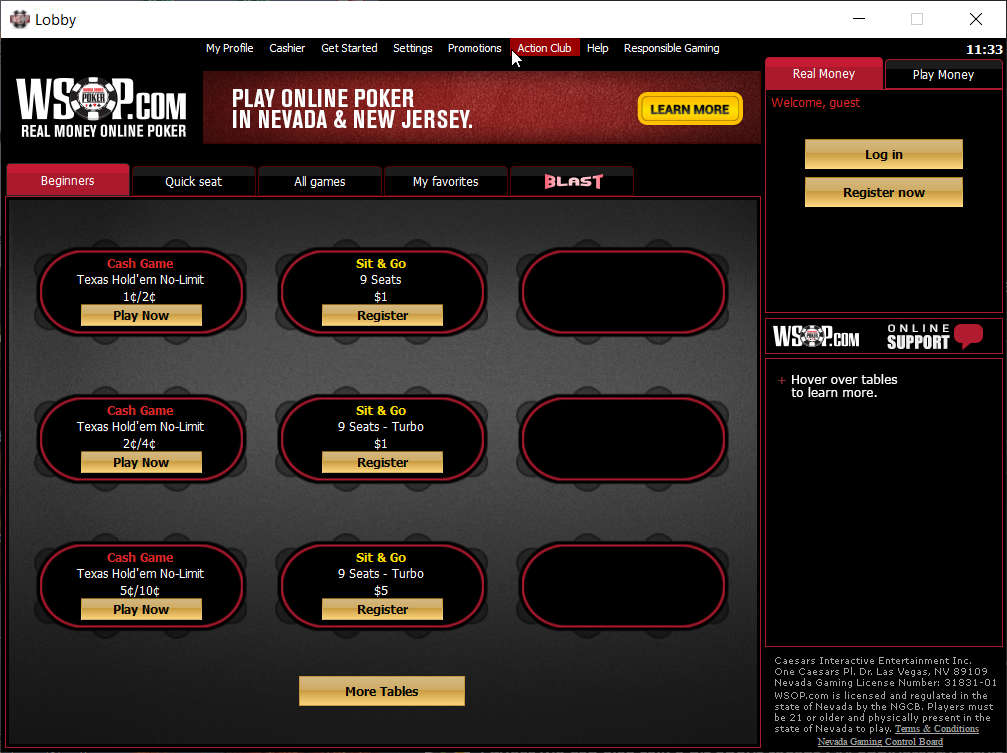
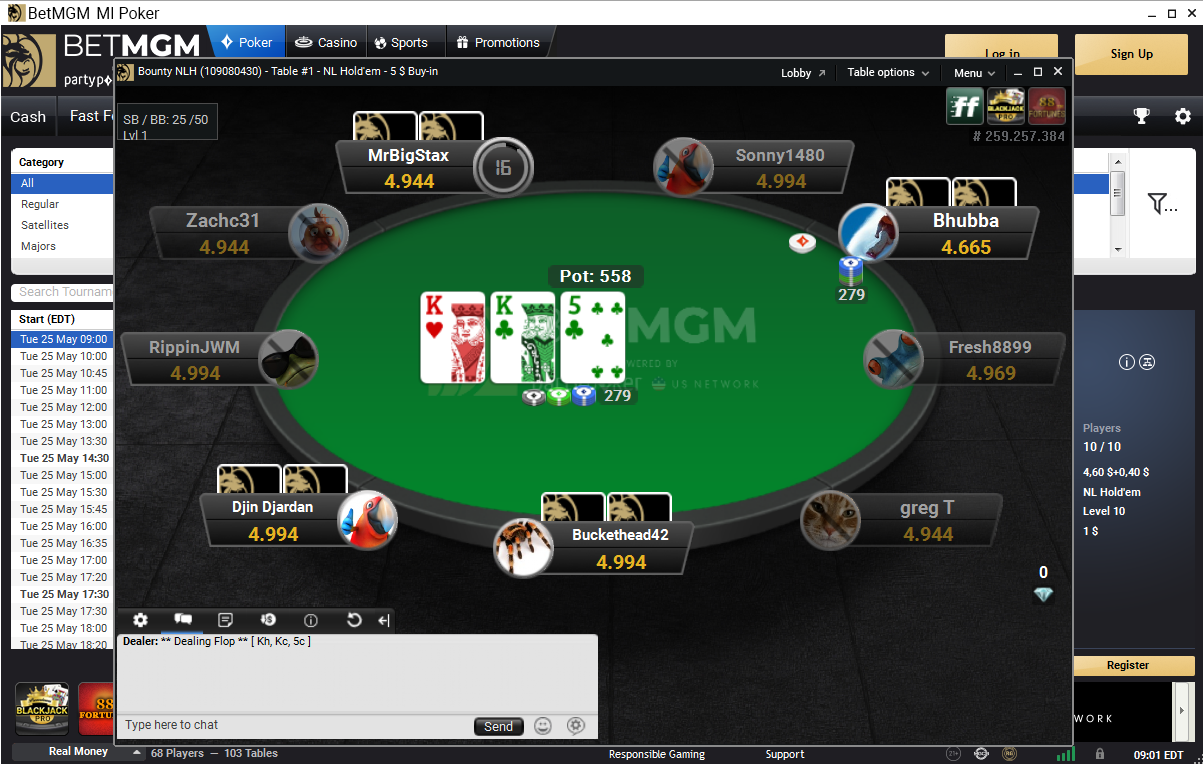
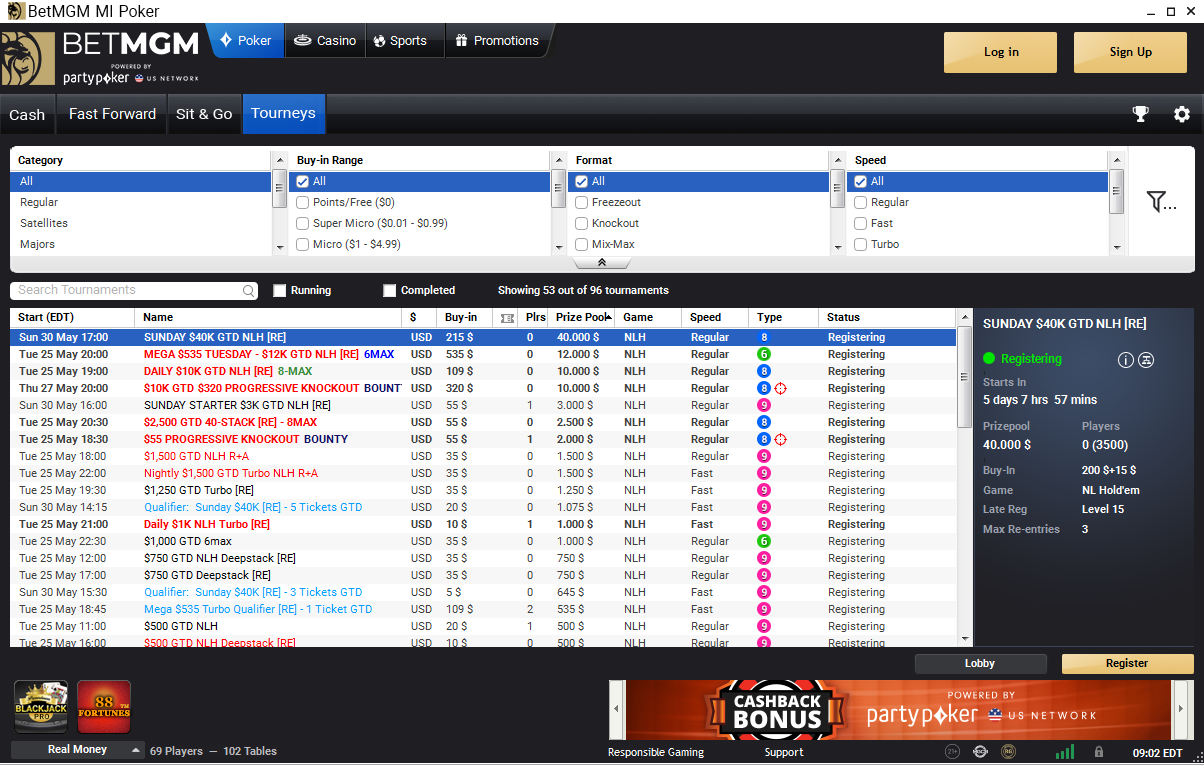
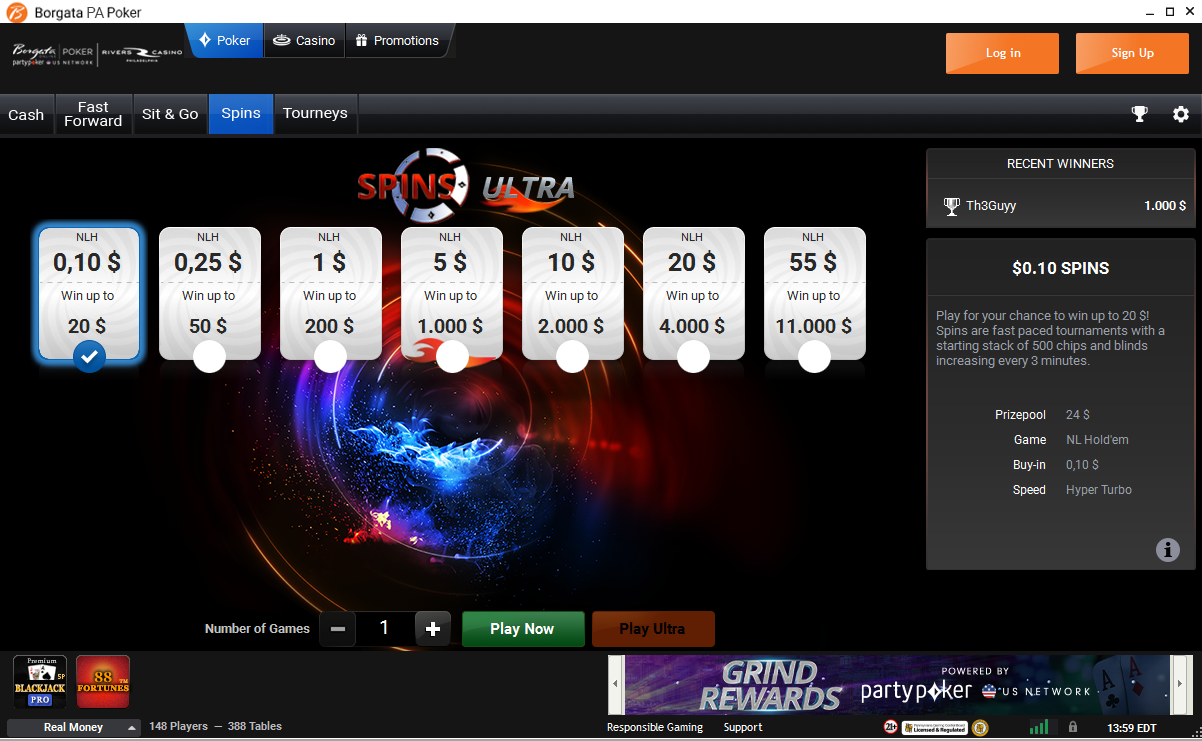
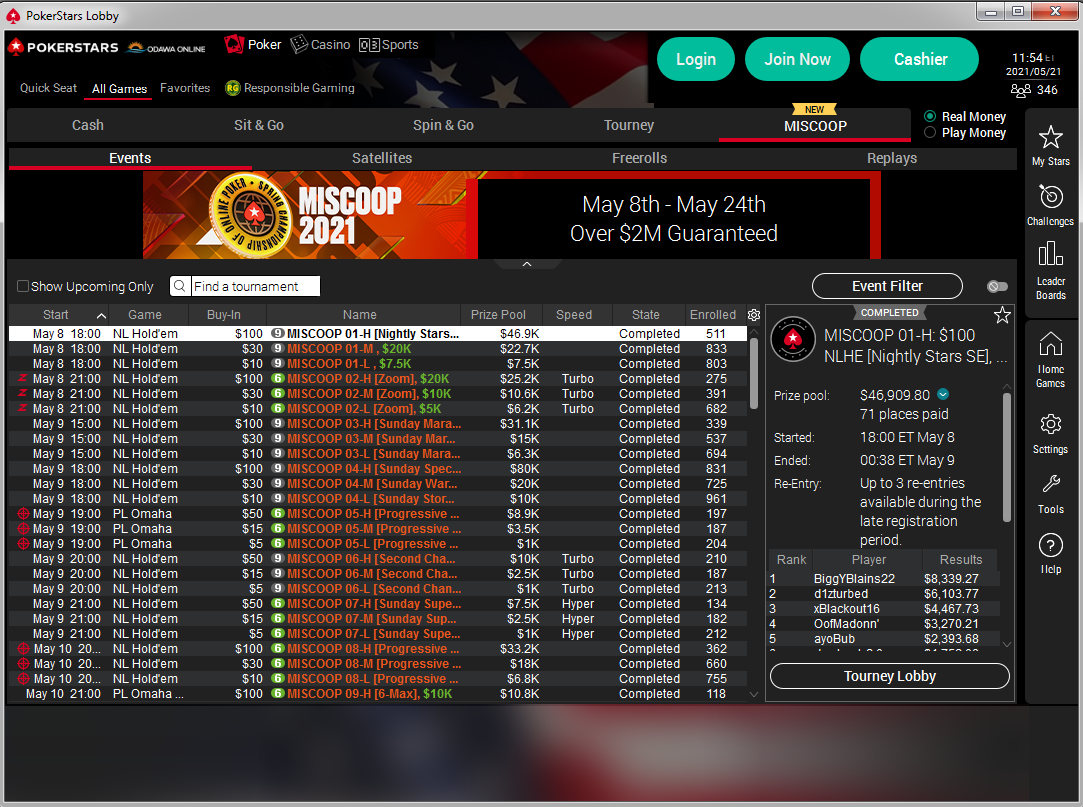
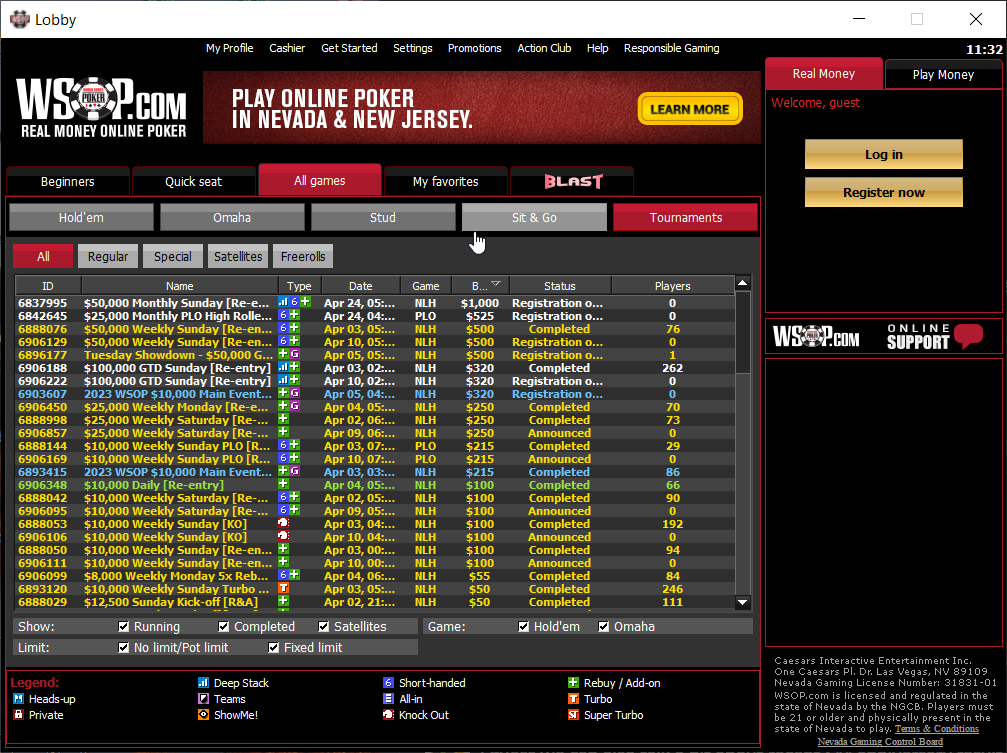
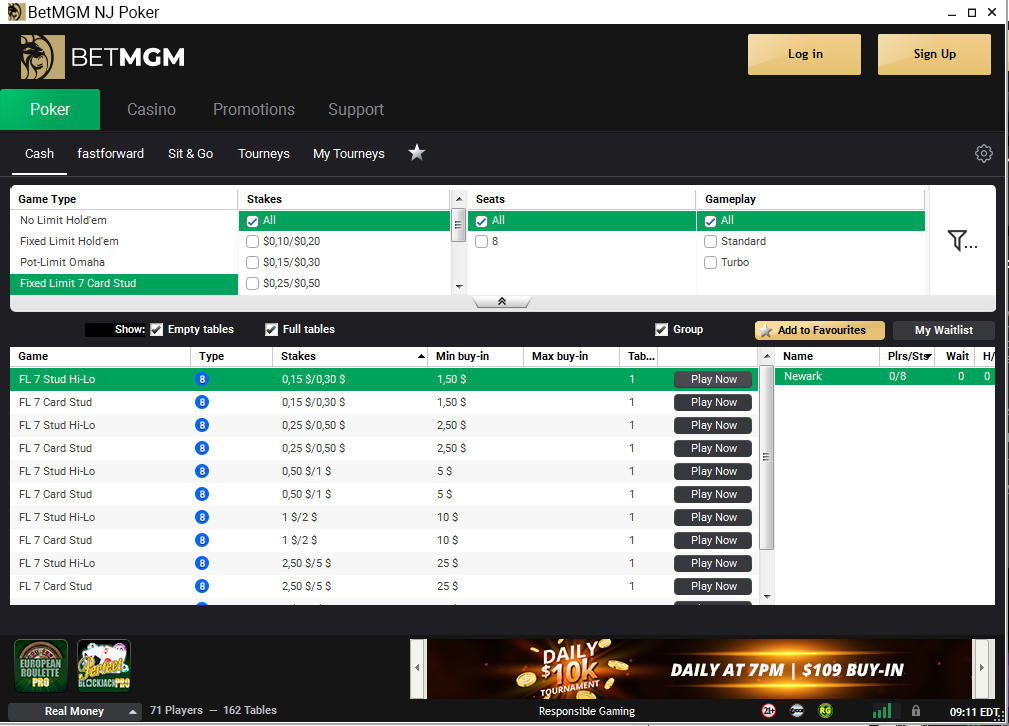
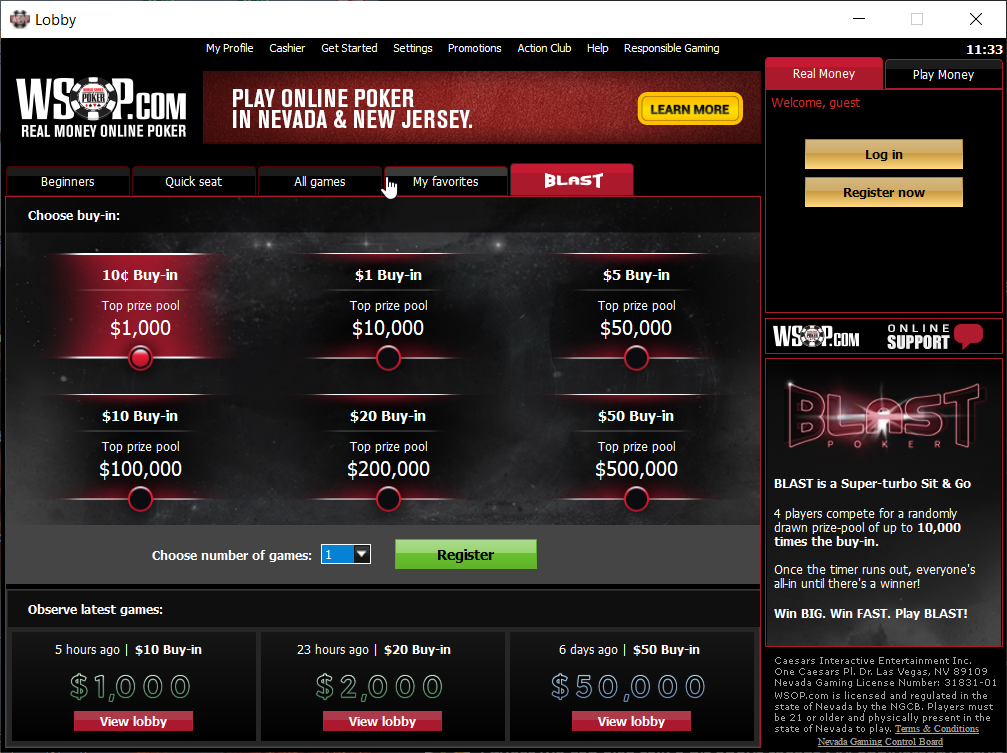
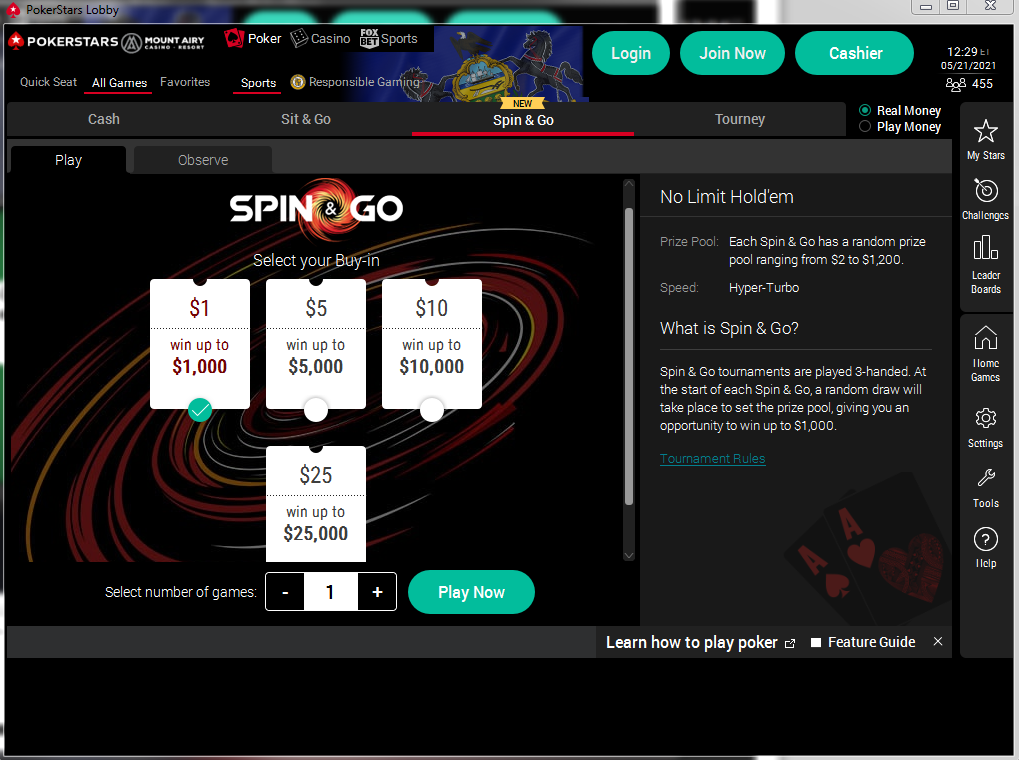
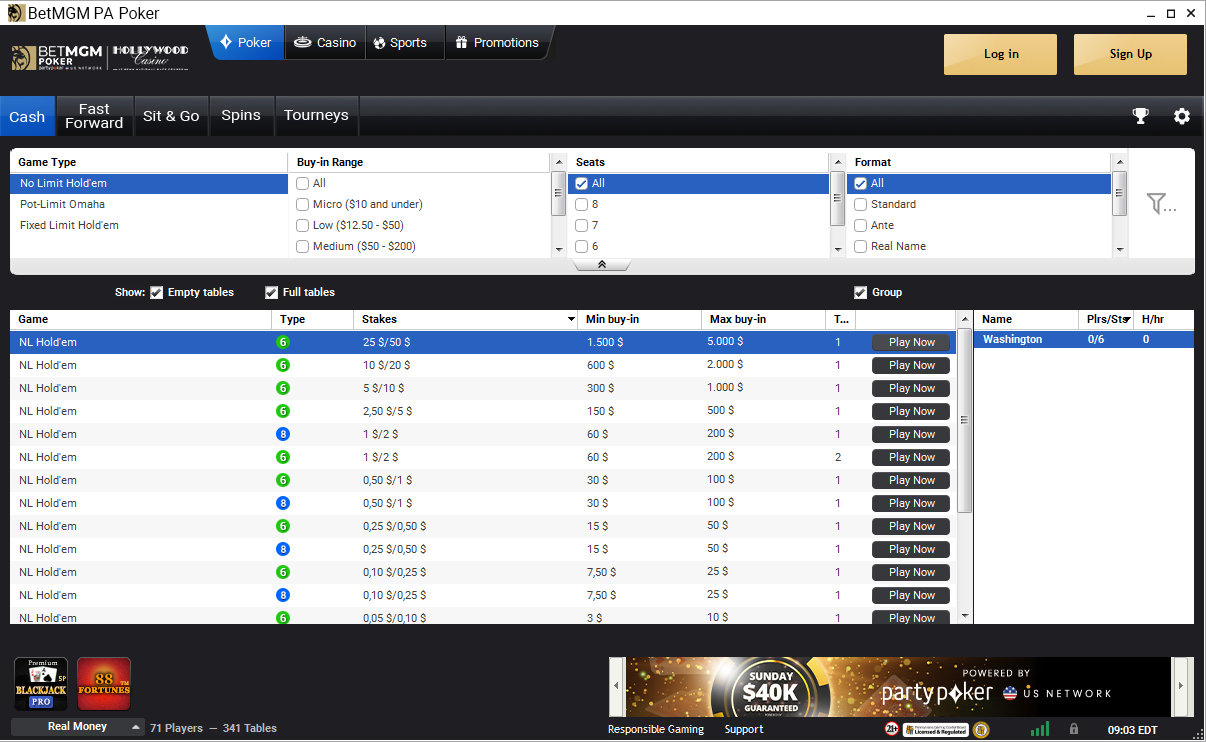

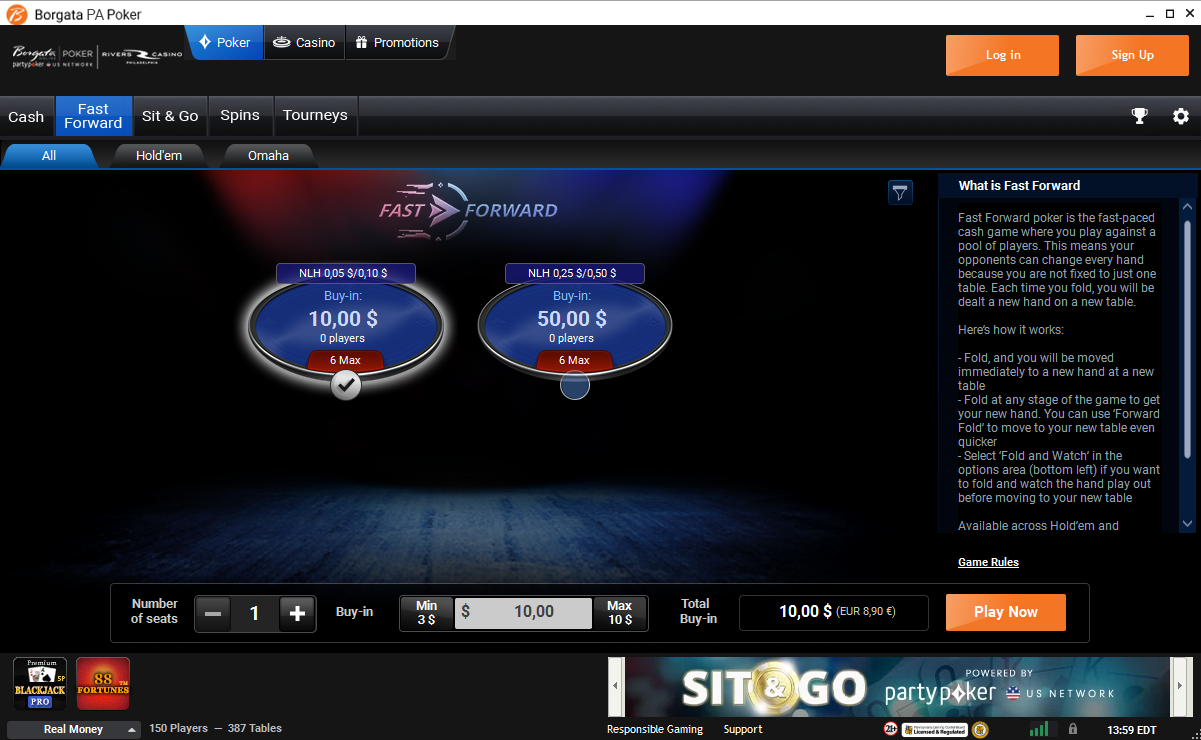
Choosing an Online Poker Site in US
Players in the US are presented with many options to play real money online poker, with both legal and risky offshore sites offering their services. Of course, we always recommend playing at a legal and regulated room for many different reasons.
Here are the main things you should look at when picking an online poker room to play at:
- Regulated in Your State: Each state issues its own licenses, meaning each operator must be licensed in every state where they wish to offer services. Make sure the site you are looking at has an operating license in your state before choosing it.
- Games & Player Pool: Different operators offer different things. Check out the games on offer and find out just how many players it can bring together. Some of the biggest sites in the US offer much more traffic than others.
- Bonuses & Rewards: Online poker operators reward their players with a variety of bonuses and promotions that add value to their play. Find out what promos are available at each site you can play at before you pick one out as your favorite.
Learn more about the choices for safe, legal online poker in our comprehensive Independent Guide to Online Poker.
How to Get Started Playing US Poker Online
Are you interested in playing online poker in the US and are looking to set up your first account? Here are the general steps you will need to follow to get started:
- Choose Your Site: Each of the states in which online poker is legal offers at least a handful of rooms to choose from. Pick the operator you want to play with based on the criteria presented in this guide and click one of the links on this page.
- Register for an Account: You must set up your player account on the site you picked. Initiate the registration process, enter your personal details, and get your username and password to play with.
- Confirm Your Identity: Regulated operators are asked to make sure that players are playing under their real names and identities. You will need to confirm your personal details before you can start playing for real cash.
- Download an App: Mobile poker apps allow you to get in on the action via your phone or tablet. If you want to play on your mobile device, you must download the appropriate app, which can be found in the App Store, Google Play Store, or directly on the operator’s site.
- Make Your Deposit: Once you sign up, you may be offered a no deposit bonus to test the site with. Yet, you will likely want to make a real money deposit to claim your full welcome bonus package, which typically includes a 100% deposit match bonus, and get involved with some real games at your chosen operator.
Geolocation Is Everything
While online poker is now regulated in a number of states, and others are contemplating following the trend, all regulation is still done exclusively at the state level. Operators must obtain licenses in each state where they want to offer services.
Under the terms of all licenses given out by the various state gaming regulators, only players playing from within the state in which the operator is regulated are allowed to play for real money.
This means any American citizen or resident can sign up for an account at a site that’s regulated in any of the states, but they can only play real money poker when they are physically present in that state.
To ensure that players abide by the rules, the operators go beyond simple GPS tracking of the devices players are playing on (which can be tampered with) and install their own geolocation software on your device.
Whenever you download any legal US online poker app or platform to a device, you will be asked for consent for such geolocation software to be placed on your device.
The software will track your actual location and ensure you are not trying to play from outside the legal jurisdiction you are allowed to play in.
There are no privacy concerns in place, as all operators are obligated by their license to keep all player information private and secret at all times.
If you decide not to install the geolocation software, you will not be allowed to play real money games until you do.
It is important to note that all legal online gambling sites are obligated to track your geolocation and make sure all players on their platform are in perfect compliance with the state and federal regulations and laws pertaining to igaming.
How to Tell if an Online Poker Room is 100% Legal and Regulated
With so many different operators out there — many of which advertise to be “the best poker site for US players” — how can you be sure which sites are regulated and which are not? Here are a few things to look out for in your pursuit of a legal place to play:
- The Regulator’s Seal: There is one unmistakable way to determine if an operator is legal and licensed in your state: your state regulator’s seal. Each licensed operator will have this seal listed on its website. You can confirm its seal by visiting the regulator’s website and ensuring the site is truly licensed in your legal jurisdiction.
- Not Available in the Entire US: Online poker is only legal in a handful of states at this time, which means that any operator that offers its services beyond these states is not operating legally. What is more, some regulated operators only work in one or two states, so you should inform yourself about the site’s status before signing up.
- Operated by US Companies: To acquire a US license, an operator must have a US-based company behind it. This means that even big international brands like PokerStars must create companies in the US to offer their services, and this makes them legally responsible for all their actions within the US.
- Land-Based Casino Partners: In all states where online poker is regulated by law, online operators must have live casino partners to back their operations. On legit sites, these will be major casinos you have heard of, and the partnership will help you trust your online poker brand more and feel more relaxed playing there.
- Phone Contact Available: Every US-based and regulated online poker site will have a contact phone number to contact customer support representatives. This is not a common practice for offshore sites and is another recognizable feature of legal online gambling sites.
- Loyalty Programs and Rewards: While offshore sites also offer loyalty schemes and player rewards, major American brands differ. You will be able to tell from the quality of the programs and their common association with major casinos in the US that these are US companies with a proper gaming license. Look at PokerStars Rewards and BetMGM Rewards and see what a quality rewards program from a legal US operator offers.
What Makes Legal Poker Sites Better?
Since online poker rooms are still so few and only available in a few states, you may be wondering why you should go through the trouble of finding one. After all, you have heard of people playing at offshore sites and having a decent enough experience. However, there are clear advantages to playing at regulated sites, and here are a few of them:
- Games are Fair: Every online operator advertises that their games are random and fair, but is this actually true? You can only really be sure with operators that offer their services under a proper gaming license, which means that the site is subject to strict standards and must regularly prove to the state regulators that its platform is totally random and fair.
- Your Funds are Safe: One of the main problems players can face when playing at illegal poker sites is that the operators use their funds to fund their operations. Or worse — the operator can disappear and take all your money with them. Your money, financial data, and personal data aren’t safe at illegal offshore sites. At regulated sites, players’ funds must be held safely segregated from operating funds, which means you are always guaranteed to get your money in case of the operator experiences any problems.
- Major Brands: Playing at regulated sites in the US means being part of something big. Major brands like WSOP, PokerStars, and BetMGM are all present in the US online poker world, and you can play with them by joining a player pool that includes famous pros and more.
- Player Safety First: Regulated sites must ensure the safety of their players at all times, and this means that responsible gambling practices must be in place. You can ban yourself from playing at legal sites or limit your deposits if you happen to be experiencing problems controlling your play.
- Right to Privacy is Protected: All online poker sites, legal or not, require you to share a lot of personal information, including copies of your personal documents. While offshore sites are not obligated to keep those private, regulated sites are obligated not to share or sell your info.
- Taxes Go to Good Causes: In the USA, online gambling operators pay significant taxes on their revenue. Instead of going into the pockets of private companies or rogue governments, this money goes to help your community’s schools, improve social programs, and make life in your closest environment better for everyone.
US Online Poker Tournaments
Tournaments have always been the biggest reason for people to take up online poker, and that is one thing that has not changed over the past few decades. Offering big, often life-changing wins available to everyone, tournaments made poker the phenomenon it is today.
There are numerous options available for playing online in the USA. All licensed operators offer rich daily multi-table tournament (MTT) schedules, combined with major series taking place throughout the year, offering six and seven-figure guaranteed prize pools.
When it comes to daily schedules, you can find anything that suits your bankroll and preferences, from complete freerolls to high-roller events that will cost up to $1000 to enter. There is also a good spread of satellites and feeder tournaments, allowing those with smaller bankrolls to qualify for larger events at reasonable prices.
Tournament series are where it’s at, though, usually offering several weeks of non-stop action and boosted guarantees. While some of these are one-off occurrences, there are quite a few that US players can pretty much count on every year, such as:
- PokerStars: USCOOP and SCOOP
- WSOP: Bracelet events, WSOP Circuit series, Winter Series
- BetMGM: State Poker Championships
Extra Value — Bonuses and Promotions
Regulated rooms offer some of the world’s biggest and most lucrative bonus offers and promotions. As the sites compete for traffic and new players, welcome bonuses have never been juicier, and players can benefit from a host of valuable promotions and reload bonuses as well.Welcome Bonuses
The first thing to welcome players at practically every regulated US room is a welcome bonus. These bonuses are often worth as much as $1000, which is a great way to start building your bankroll.
Online poker bonuses are generally issued to players as a form of rakeback, which means you will have to play real money games to get your hands on the bonus. As you play real money poker and accumulate loyalty points, your bonus will be released in 5%, 10%, or more increments. In either case, expect a high return on any rake paid while your welcome bonus is active.
No Deposit Bonuses
While getting a deposit bonus when you fund your account for the first time is common worldwide, no deposit bonuses are seldom found outside of the US. However, you can get some cash or tournament tickets at US poker rooms at most sites just for signing up.
These no deposit bonuses are given to every player who signs up as a chance to try playing real money games without having to make a deposit beforehand and are a great opportunity to explore the site. If you live in a state where online poker is legal, you should look into the no deposit bonus offers that are available.
Scroll up to the top of the page to see how the leading operators’ bonuses compare.
Loyalty Programs and Rewards
Another great way to benefit from playing online is through the various loyalty schemes and rewards programs that the operators have in store for you. Loyalty points are awarded based on how much you play and the rake you pay, and they can be converted into cash, bonuses, and other real rewards.
Ensure you understand the loyalty scheme of the site you plan to play at before committing any significant funds. After all, the difference between an outstanding loyalty program like BetMGM Rewards or PokerStars Rewards and a poor one can be a very big factor in your bottom line.
Freerolls
Freeroll tournaments are among the most popular promotions available at poker rooms in the US. As the name suggests, these tournaments are free to enter, but they offer prizes that have actual value. Sometimes, it is cash, sometimes tournament tickets for real money events, and every now and again, there are valuable items and even travel packages up for grabs.
While some freerolls are free to enter and available to all players on a site, most have certain requirements. For example, there are often freerolls for new depositing players or those open to players who perform well in other real money events, etc. Either way, when available, these provide a great opportunity to boost your bankroll.
Banking Options
As long as you play at a fully licensed and regulated site, you will have no problems depositing money and withdrawing funds from your account. While the exact options may vary from one state to another, all licensed operators support a solid number of completely safe and reliable methods.
It is important to note that, unlike with offshore sites, your money and sensitive financial information are treated with the utmost care and always protected. State regulators require this from all licensed sites, so you can play with confidence.
As for the methods that are available, these include:
- Major credit and debit cards (MasterCard, Visa, AmEx, etc.)
- E-wallets like Skrill and PayPal
- E-checks
- Bank transfers
- Payments at the room’s partner casino location
Cryptocurrencies are not supported by any legal gambling sites in the US, and if you come across any operators that accept crypto, you can immediately be certain that the relevant state authorities do not license them.
Online Poker vs. Live Poker — Which is Better?
Live poker is available across the country, and no matter where you live, there is likely an in-person poker room close to you. Now that online play is also becoming more widely available, let’s weigh the pros and cons of online vs. live poker and determine what advantages you may get from playing on the virtual felt.
- Play Anywhere: To play poker in a casino or another in-person establishment, you have to actually get there first, which can be both time-consuming and inconvenient at times. You can play online poker anywhere within the state without even having to put your pants on.
- More Action: Many live poker rooms only spread one tournament per day or have only a handful of tables running. Playing online gives you access to various games and stakes that live rooms can hardly match.
- Available Around the Clock: Even more important, you can play online anytime. You no longer have to spend long nights at the casino, as poker is now available at all hours of the day.
- Bonuses & Promos: Live operators do their best to reward their players, but the costs of running brick-and-mortar establishments are high, which makes it more difficult. On the other hand, online poker rooms are happy to give away a big chunk of their rake back to the players in the form of various bonuses, promotions, and loyalty rewards.
- Big Field MTTs: Big live tournaments only run in a handful of places, while such events can be found online very often and without much trouble. You can now play tournaments with hundreds of players, and you won’t even need to leave your house.
- Less Rake: Another function of the lower cost of running games and more games running simultaneously, poker sites can offer games with lower take. This means you will be paying less to play the same kinds of games offered in live establishments, which is a double win.
- Get Help Faster: Online operators offer customer support during business hours and can resolve any issue you have very quickly. In-person poker rooms don’t always have the staff on hand to help with all player requests and can’t resolve all complaints and issues in the first place.
History of Online Poker in the US
The history of online poker in the US is as long its history worldwide, as some of the first operators launched in the States at their inception. Here is how we got from there to here in a few major milestones.
- Online Poker Launches: The first operators launched in the 1990s, offering their services to anyone who would have them. US players could play at the original partypoker and Planet Poker, sites that operated without any real licenses.
- The Moneymaker Effect: In 2003, the poker world was shaken up by Chris Moneymaker, an American accountant who qualified for the WSOP Main Event at PokerStars and won it! Thousands of players sought to replicate his success, and the player pools grew rapidly, initiating the so-called Poker Boom, which started with Moneymaker’s victory.
- US Congress Passes UIGEA: Just three years after Moneymaker won the WSOP Main Event, the US Congress passed the Unlawful Internet Gambling Enforcement Act (UIGEA), which made processing financial transactions related to online poker illegal in the US. Operators like partypoker and 888Poker exited the market, while others, including PokerStars, continued offering their services to Americans.
- Black Friday: The US and the international community was shaken on April 15, 2011, when the US Department of Justice seized the domain names and physical assets of PokerStars, Full Tilt Poker, and Absolute Poker. The sites were shut down for US players, and though PokerStars was able to pay out its players in the States shortly after, Full Tilt Poker and Absolute Poker players were left with millions in balances, and they could not cash out.
- States Begin Regulation: Nevada, Delaware, and New Jersey all regulated online poker in 2013, paving the way for the first legal sites and the future of online poker in the US. It would take four years before another state would legalize online poker and nearly five years before a multistate network would span the first three states.
- New States Enter the Fold: Pennsylvania regulated online poker in 2017, followed by Michigan and West Virginia in 2019, and Connecticut in 2021. However, no operators have launched yet in WV or CT.
- Multi-State Online Poker Network Expanding: While interstate online poker first became a reality in 2015 with WSOP NV joining sites in Delaware (WSOP NJ would join the network in 2018), no other New Jersey operator was active in Nevada or Delaware, so shared liquidity was limited to a single network in the US. But the addition of Michigan to the Multi-State Internet Gaming Agreement (MSIGA) in April 2022 would open up the possibility for two more multistate networks to emerge in the US — PokerStars and BetMGM Poker — as well as providing the opportunity for WSOP to create the country’s very first four-state network.
- PokerStars MI and PokerStars NJ Combine Player Pools: On January 1, 2023, PS MI combined its player pool with PS NJ, becoming the first operator to take advantage of Michigan joining the MSIGA.
- Online Poker Closes in Delaware: In December 2023, for the very first time, US residents lose access to legal, regulated online poker, when the DE Lottery switches providers from 888 to RSI.
- WSOP Michigan merges with NJ and NV: On May 27, 2024 WSOP Michigan combined player pools with networks in New Jersey and Nevada.
- BetMGM Poker combines NJ and MI: In November 2024 BetMGM Poker announced it was merging player pools in Michigan and New Jersey. Players on PartyPoker and Borgata also benefit as they play on the BetMGM network.
- Pennsylvania joins MSIGA: In late April 2025, Pennsylvania finally joined the MSIGA. WSOP Online and BetMGM Poker were quick to react, immediately adding PA players to their existing networks, with WSOP becoming the first four-state platform.
Shared Liquidity & Multi-State Online Poker
In the US, online gambling is currently regulated at the state level. Every state has the right to create and pass its own rules and legislations, and these laws are only valid within the state borders. Currently, no federal laws deal with online gambling in the US, and it does not seem likely such a law will be passed in the foreseeable future.
In the current setup, operators regulated by a particular state are only allowed to offer real money online gambling for players physically present within its borders. For example, a person from California can register with a site licensed in Michigan, but they will only be allowed to play real money games while physically present in Michigan.
The term multi-state poker or interstate poker (also referred to as Shared Liquidity) in the US means allowing players from different states to play against each other in the same player pool. Without federal regulation in place, it is down to states to figure out how and if they want to allow this.
To those unfamiliar with the topic, it may seem that states would be quick to jump at the opportunity to merge player pools and create bigger, more sustainable environments. However, while there is no federal law regulating online gambling, a federal act — the Wire Act — has been giving state regulators a pause when it comes to crossing state lines.
The Wire Act and Its Role in US Online Poker Expansion
Passed in 1961, the Interstate Wire Act was designed to prevent illegal betting across state lines. The Act made using wire communications to place bets outside of state lines illegal. Its original intention was to hinder mob activity in the sports betting business.
At first glance, nothing in the Wire Act pertains to online poker, and the idea of online gambling was not even a thing at the time. However, as often happens with old laws, this particular one found its way into the modern environment.
It was in 2018 that the US Department of Justice released its interpretation of the Act, claiming that its scope extends beyond sports betting and covers other forms of online gambling — online poker included. This was the DOJ going back on its earlier interpretation from 2011, which stated that activities unrelated to sports betting were outside the Wire Act scope.
This interpretation is probably the biggest reason why there has not been more movement on the interstate poker front.
Prior to this, in 2014, Nevada and Delaware had already signed an interstate compact. New Jersey joined the agreement, which came to be known as the MSIGA (Multi-State Internet Gaming Agreement) in 2017. Michigan joined the MSIGA party five years later, signing on in April 2022.
To this day, these four states are the only ones to share player pools across borders. WSOP US was the first — and for a very long time, the only — operator to really take advantage of this opportunity, linking up platforms in NV, DE, & NJ.
The PokerStars US Network went live on January 1, 2023, combining its Michigan and New Jersey player pools. It was the first network to share liquidity with Michigan since it joined MSIGA the year prior and only the second multi-state online poker network in the country. The value of shared liquidity can easily be seen in PokerStars’ post-merger numbers. The bigger pools, bigger tournaments, and bigger prizes have clearly been a big hit, helping the Red Spade soar to the top of the MI & NJ markets.
US Courts Ruling Against the DOJ Wire Act Interpretation
The 2018 DOJ decision, accompanied by threats and warnings (which never came to fruition), was a reason for concern for state governments. New Jersey, which spearheaded the path of safe and legal online poker in the US, filed a lawsuit demanding answers and clarity. The New Hampshire Lottery Commission did the same, fearing that this could harm their interstate sale of lottery tickets.
In 2019, a US District Court dismissed the DOJ interpretation of the Wire Act, underlying that it had “significant coherence problems.”
The DOJ filed an appeal, and the case went in front of the Court of Appeals. The case was heard once again, and the Court of Appeals upheld the original decision, striking down the 2018 interpretation.
The DOJ had one last instance available to them, as they could have taken the case to the US Supreme Court. But with the new administration in place in Washington, the interest in pursuing this matter seemingly disappeared.
Finally, the path was clear for the expansion of US online poker.
Michigan Joining the MSIGA
The MSIGA is currently the only active multi-state online poker compact in the US. It was originally signed between Nevada and Delaware, and New Jersey joined a few years later.
With some clarity on the Wire Act situation finally available, other regulated states have been looking into their options, and Michigan is leading the way.
Namely, the state was approved by the other three states’ regulators to join the Multi-State agreement as its fourth signatory and subsequently became a full member of the agreement. Michigan is the second-largest regulated state, with a population of over 10 million.
Currently, there are three sites operating in the Mitten State: PokerStars, WSOP, and BetMGM. All three have a presence in New Jersey.
Pennsylvania Joins MSIGA
As of April 2025 Pennsylvania finally joined MSIGA, allowing them to finally combine player pools across state lines.
WSOP Online connected its network across all four states. BetMGM Poker also connected PA to its Michigan and New Jersey player pools as soon as it was legal to do so.
US Online Poker Sites FAQ
How can I play online poker in the US?
You can sign up with any regulated site by visiting the operator’s page and filling in the required details to open your account. While it’s possible to sign up from pretty much anywhere in the country, you should keep in mind that you will only be allowed to play for real money while physically present in the state where that particular room is regulated. So, for example, you can only play on PokerStars PA while in Pennsylvania.
Who regulates online poker in the US?
Every state has a regulatory body in charge of licensing and overseeing all online gambling. In the US, online poker rooms are regulated on the state level, and no overarching federal body oversees their operations.
How can I tell if a poker site is legal in the US?
The best way to know if a site is legal is by checking out its licensing information. This info is available on the page, usually in the footer, and it clearly indicates what organization is in charge of its licensing and regulation. In New Jersey, for example, this would be the New Jersey Division of Gaming Enforcement (NJDGE).
On top of this, regulated sites are owned by well-known companies and do not cater to players from the entire country but rather from the individual states where the operator is licensed. Licensed US gambling sites also do not accept Bitcoin or other cryptocurrencies.
Not all of them are available across all regulated states, but you can rest assured that these are your best and safest picks.
Are US online poker sites rigged?
No, US online poker rooms are not rigged. The United States has strict regulations in place to ensure that all games are fair and honest for players. The various state gaming commissions and regulatory bodies that oversee online gambling, such as the Nevada Gaming Control Board, conduct regular audits and inspections of the software and systems used by these sites to ensure that they are operating fairly and that all games are random and unbiased.
Are US online poker sites safe?
Regulated online poker rooms in the US have more robust security measures in place to protect player information and ensure fair gameplay. These sites are licensed and regulated by a reputable authority, such as a state gaming commission, which provides oversight and enforces regulations to ensure that the site is operating in a fair and safe manner.




